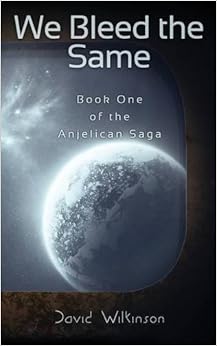 The
cover of We
Bleed the Same
features a shaven-headed human figure staring out of a large porthole
window at an alien planet. It thus promises an old-fashioned space
adventure. But the title also alerts to us a story that wears its
conscience on its sleeve.
It
recalled for me Shylock's urgent cry against racism in 'The
Merchant of Venice': 'If
you prick us, do we not bleed?'
We return to this slogan when our protagonist, Danny Parque wakes up
in a hospital bed on a Federation ship; the medics are 'blind
to the affiliations of our patients.'
Good news for Danny as he's the enemy until proven otherwise.
Suffering multiple fractures and radiation sickness, he's already
been through the wars and his mettle thoroughly tested. He started in
chapter one as a Government Press Officer living a cushy life on the
Imperial planet of LaMarque. But when the Governor proposed a return
'to
the gulag'
for the planet's uranium miners, Danny risked all and soon found
himself outlawed. It's a theme that recurs throughout the novel.
Later during his sentence aboard an Imperial Navy ship, his mentor
'the Yak', recalls his own moment of truth: 'Ijjalion
happened … I held my soul in my hands … and I had to decide what
colour it was. We were at the Gates of Hell and Cavendish pushed us
through.' For
months Danny tries to find out 'What
happened at Ijjalion?'
but no-one will tell him. When the answer comes mid-way through the
novel we see why the Yak shuddered at the memory. It is a powerful
scene worth waiting for which evokes crimes against humanity that are
all too familiar in our own time and world.
The
cover of We
Bleed the Same
features a shaven-headed human figure staring out of a large porthole
window at an alien planet. It thus promises an old-fashioned space
adventure. But the title also alerts to us a story that wears its
conscience on its sleeve.
It
recalled for me Shylock's urgent cry against racism in 'The
Merchant of Venice': 'If
you prick us, do we not bleed?'
We return to this slogan when our protagonist, Danny Parque wakes up
in a hospital bed on a Federation ship; the medics are 'blind
to the affiliations of our patients.'
Good news for Danny as he's the enemy until proven otherwise.
Suffering multiple fractures and radiation sickness, he's already
been through the wars and his mettle thoroughly tested. He started in
chapter one as a Government Press Officer living a cushy life on the
Imperial planet of LaMarque. But when the Governor proposed a return
'to
the gulag'
for the planet's uranium miners, Danny risked all and soon found
himself outlawed. It's a theme that recurs throughout the novel.
Later during his sentence aboard an Imperial Navy ship, his mentor
'the Yak', recalls his own moment of truth: 'Ijjalion
happened … I held my soul in my hands … and I had to decide what
colour it was. We were at the Gates of Hell and Cavendish pushed us
through.' For
months Danny tries to find out 'What
happened at Ijjalion?'
but no-one will tell him. When the answer comes mid-way through the
novel we see why the Yak shuddered at the memory. It is a powerful
scene worth waiting for which evokes crimes against humanity that are
all too familiar in our own time and world.
It is in the early chapters when Danny
adjusts to life as a 'puniserve'
(or 'puny')and a 'noob'
(newbie) aboard a battleship that the energy of the novel really
picked up for me. Danny is a prisoner working off his time but this
former bureaucrat makes friendships and learns to negotiate his way
round the ship's pathways as well as the social dynamics. Wilkinson
is brilliant at evoking the atmosphere of a group of men on a
long-haul mission. The dialogue crackles with slang and sarcasm.
Danny works as a 'beaner'
or combat-messenger, so-called because while
'most of us are safely strapped into our chairs at combat stations …
you get to rattle around like a bean in an empty can.'
On board a whole cast of complex, vivid characters jostle for our
attention and sympathies as they bicker and compete in the closed
hierarchy of a battleship squadron. There is humour and plenty of
sub-plots to thicken the intrigue. It reminded me of the gritty
naturalism of the re-incarnated BattlestarGalactica TV series.
You can hear the creaking
of those metal bulwarks and smell the stale air of their sleeping
quarters. And
like that TV series, David Wilkinson also does peril and bloody battle
scenes with great conviction.
 So why didn't the opening chapters
work so well for me? I did feel the protagonist's first moral
crisis was rather rushed and I
likewise found the figure of his La Marque girlfriend Sandie rather flat
and perfunctory – it didn't feel as if he was losing much by being
torn away from her and his home-world. Perhaps I might have thought
Wilkinson was less confident in his female characters till we got to
his hero's stint on the Federation ship where he encounters a number of
compelling women with fascinating back-stories. A major, an
interrogator, a 'bunkie'
– they each challenge and change Danny in different ways. I was
impressed that this 2nd
act of the novel opens a whole new world that is just as vividly
realised and engaging as the Empire ship. And the moral compass Danny
thought he had held onto now starts twitching in wholly different
directions as his 'captors' persuade him to take sides with the
Federation. The mission to Ijjalion will clinch it. But while Danny
keeps searching out who to trust, the author is probing the humanity,
messy and vulnerable as it is, of each of his characters.
So why didn't the opening chapters
work so well for me? I did feel the protagonist's first moral
crisis was rather rushed and I
likewise found the figure of his La Marque girlfriend Sandie rather flat
and perfunctory – it didn't feel as if he was losing much by being
torn away from her and his home-world. Perhaps I might have thought
Wilkinson was less confident in his female characters till we got to
his hero's stint on the Federation ship where he encounters a number of
compelling women with fascinating back-stories. A major, an
interrogator, a 'bunkie'
– they each challenge and change Danny in different ways. I was
impressed that this 2nd
act of the novel opens a whole new world that is just as vividly
realised and engaging as the Empire ship. And the moral compass Danny
thought he had held onto now starts twitching in wholly different
directions as his 'captors' persuade him to take sides with the
Federation. The mission to Ijjalion will clinch it. But while Danny
keeps searching out who to trust, the author is probing the humanity,
messy and vulnerable as it is, of each of his characters.
The character arc of Danny is
certainly satisfying as he develops from a rather shallow
Governor's assistant to a critical, questioning man of action at the
front-line of two competing empires. However I think the author could
trust his readers more to reach these conclusions and judge the hero
for ourselves. Quite frequently, other characters step in to
pronounce on David's moral fibre in case we've missed the point: 'You
had it all and made a stand. And then every-time you came to a
crisis, you've chosen what you think is the morally right path …'
The plotting is ambitious in scale as the action moves through four
different planets or ships, each bringing further revelations and
tests of loyalty for Danny. If the section on the world of Engalise
seems to digress somewhat, it is clearly laying the groundwork of
interplanetary histories and divergent cultures that will sustain
multiple narratives of 'the Angelican saga' to come. (Unsurprisingly, on the publisher's author page Wilkinson lists Isaac Asimov with his masterly 'Foundation Trilogy' as an early influence.) So a word to the
editors at Inspired Quill Publishing – I'd have loved a glossary for some of this that I could
refer back to. But the pace picks up as Danny and his new Federation
comrades head 'home'
to La Marque for a show-down. A very well-executed invasion scene,
lots of twists and reversals, jet fire and sonic booms and a cavalry
of horses all bring the rollicking adventure to a shocking and
suitably thoughtful conclusion.
In the parlance of the novel, this
writer is a 'noob'
but certainly no 'puny'.
The writing grows and matures much as its hero does. It finds its
stride some way in and goes on to earn its place in the stellar fleet
of spaceship sagas that thicken the skies of our sci-fi universe. The
intricacy of its world building, the dark themes of political
conspiracy and state repression, the heartfelt conflicts of its
characters are all sure to bring readers back. I can only hope the
sequel will excavate more of the history of these feuding galactic
empires, as well as their hard-fought futures. All in all, it was a
well-crafted and enjoyable debut from Wilkinson and when Danny dusts
himself down, he surely has plenty more to deliver as the hero of an
unfolding epic. If you like your science-fiction intelligent and intense, this is one saga to follow.



Great review, Siobhan. I must get up to the library and order this book. I hope everyone is using their local library. Use it or lose it!
ReplyDelete